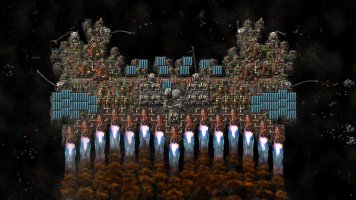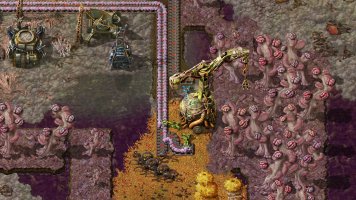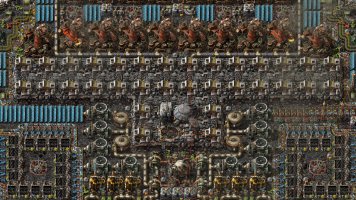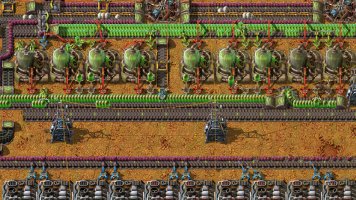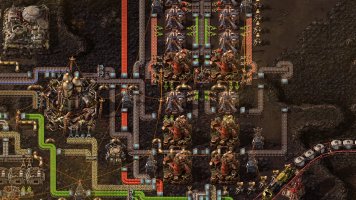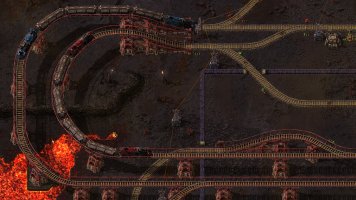General Information
Space Age seems fine with the first several hours, even the first few dozen, being almost identical to the original game. Apart from a few user-friendly tweaks, you essentially start a new Factorio game. Gather rocks and wood. Set up miners for iron and copper. Create plates to manually feed everything until you've built some boilers and steam engines. Automate your initial science packs. Research your first technologies so you can repeat the process, but on a larger scale. If Factorio never clicked with you before, Space Age probably won't change that, as you're unlikely to stick around long enough to see what it truly offers.
For me, though, I've always been hooked on factory games. I raced through the first 40 hours of automation, and finally reached the point where the DLC truly began. In Space Age, there are several new planets to explore, but first you need to build ships capable of getting you there (and preferably back) safely. When I started crafting my first rocket, my production levels came to a standstill.
My previous knowledge was useless in this alien environment. I had to slowly figure out how to send foundation pieces and other items up to my ship to start expanding it; how to place asteroid-catchers on the edges and then sort the different asteroid types through specialized crushers to extract new resources like carbon and ice. How to turn those into rocket fuel, and then automate ammo production for my gun turrets so I could destroy large asteroid chunks before they turned my creation into a lonely, silent disaster in space.
Space Age arrived at the perfect moment in my playthrough, just when I might have started feeling fatigued. It was like starting anew, relearning Factorio from scratch. Gone were the days of careful planning; now I faced endless challenges, collisions, and bewildering item descriptions. Yet, I relished every second. When tired, I'd marvel at the stunning animations on my spacecraft. The unfolding foundations resembled intricate metal origami, while asteroid collectors, like robotic tentacles, snatched space debris. Factorio's animations have always been impressive, but these new structures are truly artistic.
My journey led me to Vulcanus, my first new planet. Departing from my trusty ship Hephaestus, I landed on a hellish, lava-covered world. With an empty inventory, I was truly starting from zero, and the familiar rules no longer applied.
Vulcanus felt genuinely unique, not just in appearance but in its very essence. While familiar resources existed, obtaining them was entirely different. No iron or copper patches dotted the ground; instead, I had to mine rocks for iron, copper, stone, and a new material called Tungsten. Power was my first priority, but what to use? Solar power seemed promising given the planet's proximity to the sun, but I lacked resources for batteries and didn't want my factory shutting down nightly. Steam power appeared viable, but how could I source water on a lava planet?
The solution was ingenious: pump sulfuric acid from geysers, combine it with calcite in a chemical plant, and voila - superheated steam! This steam could be cooled to produce water, then fed into the familiar boiler and steam engine setup for usable power. What a thrilling process of discovery! Of course, I later realized I could have simply fed the superheated steam directly into turbines for massive energy output. But hey, live and learn.
Vulcanus truly feels different. Not just its atmosphere and terrain, but the very processes themselves. Familiar resources are present, but acquiring them is completely new. There are no iron or copper patches on the ground. Instead, I had to strike rocks to obtain iron, copper, stone, and a new resource called Tungsten. Before I could do anything meaningful, I needed a power source. But what to use? Being close to the sun, solar power seemed promising, but I lacked the resources for even a single battery, and I didn't fancy my entire factory shutting down every night. Steam power sounded good, but how could I get water for steam on a lava planet?
It turns out, all you need is some sulfuric acid, pumped in through geysers, then fed into a chemical plant with a bit of a new resource called calcite, and that's enough to produce ample super-heated steam. You can then cool the steam to produce water, before feeding it into a familiar boiler and steam engine setup to produce steam at a lower, more useful temperature. Presto, you've got steam power on Vulcanus! And what a delightful process of discovery it was. Of course, I realized later that night that I didn't need to do any of that; all I needed was to pump the original super-heated steam into some turbines for enormous amounts of energy. But hey, now I know for next time.
The primary goal of visiting Vulcanus is to create its unique science pack: Metallurgic Science. Each planet offers a distinct type of science, which you must automate to progress through research and reach the endgame. As I explored, new possibilities emerged. I could channel magma into the Foundry for endless iron and copper, use sulfuric acid to turn coal into oil for plastic circuit boards, or brave the unexplored areas for Tungsten deposits. However, the landscape teemed with massive worms called demolishers, deadly to the touch and nearly indestructible. When I first spotted a (small) demolisher near my base, I couldn't help but chuckle nervously.
At least these demolishers were passive, only attacking if you invaded their space or provoked them. But I soon realized I'd left Nauvis, my home planet, too hastily. The entire solar system runs in real-time, regardless of your location. In orbit, my ship Hephaestus continued to weather asteroid impacts. Back on Nauvis, my turrets ran out of ammo and fell to Biter attacks. I could only watch helplessly until I found a way off-planet. This new tension in Factorio was exhilarating.
Fortunately, some quick thinking and focused work allowed me to build a rocket and return to Hephaestus. After 15 hours of worms and lava, Hephaestus felt like a welcome sight. It was a moment of true accomplishment. This feeling intensified when I returned to Nauvis, where I spent hours reinforcing defenses, replenishing resources, and preparing for future absences.
The constant juggling of priorities across multiple planets adds a new layer of complexity to Factorio. You're no longer just managing a single factory but an entire interplanetary network. This expansion of scale brings fresh challenges and opportunities, keeping the game engaging even for seasoned players.
As I continued to explore and expand, I found myself constantly learning and adapting. Each planet presented unique obstacles and resources, forcing me to rethink my strategies and come up with innovative solutions. The thrill of discovery, coupled with the satisfaction of overcoming seemingly insurmountable challenges, kept me hooked. Factorio's Space Age expansion truly elevates the game to new heights, offering a rich, multi-layered experience that will keep players engaged for countless hours.
The new space systems in Factorio: Space Age are as complex as ever, offering no easy entry for newcomers. The learning curve remains steep, much like the base game. However, the free 2.0 update, available to all players, brings welcome improvements. It introduces simpler fluid mechanics, enhanced terrain generation, and numerous small but impactful changes. While these tweaks might seem minor to outsiders, they're significant for dedicated players. New features like the Factoriopedia and helpful tips with videos make the game slightly more approachable, though it remains one of the most intricate games out there. Space Age extends the journey, making it more challenging but also more rewarding than ever.
Wube Software's trademark depth and quality shine through in Space Age. The expansion strikes a balance between simplifying some aspects and adding complexity to others, always aiming for an engaging experience. Despite spending 100 hours in my save file, I've only explored Vulcanus so far. However, years of addictive and intellectually stimulating gameplay have proven Wube's expertise. From what I've seen, Space Age seems to be the ultimate realization of Factorio's potential.
The expansion maintains Factorio's core appeal while introducing fresh challenges. It expands the game's scope from managing a single factory to overseeing an interplanetary network. This increase in scale brings new layers of complexity and decision-making, keeping the game engaging even for veteran players. Each planet presents unique resources and obstacles, forcing players to constantly adapt their strategies and develop innovative solutions.
The thrill of discovery and the satisfaction of overcoming seemingly impossible challenges remain at the heart of the Factorio experience. Space Age amplifies these elements, offering a rich, multi-dimensional gameplay that promises to keep players engrossed for countless hours. It's a testament to Wube's understanding of what makes Factorio special, and their ability to build upon that foundation in meaningful ways.


